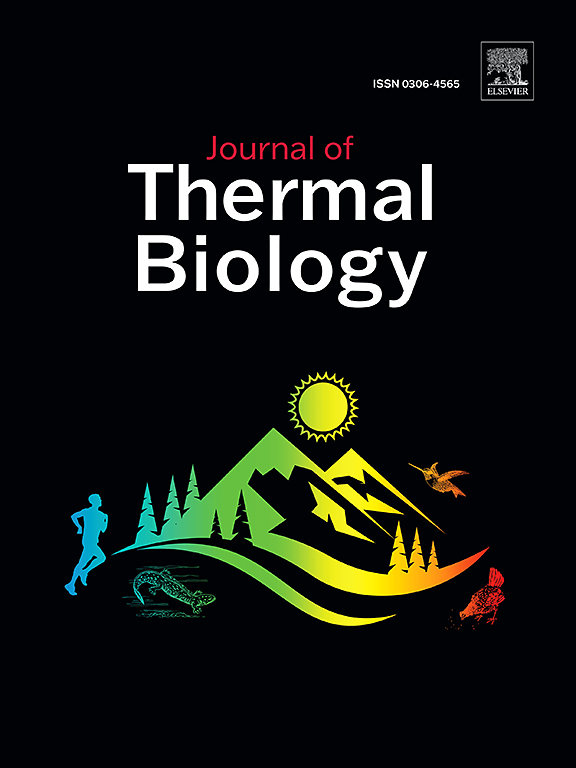冷水类蛇蝇的热适应机制:蛋白质稳态和代谢途径的调节
IF 2.9
2区 生物学
Q2 BIOLOGY
引用次数: 0
摘要
全球气候变化正在推动太平洋北极冷水地区的快速变暖。作为这些地区的优势种,萨尔氏蛇虫复合体受到海洋变暖胁迫,导致其分布格局、生理行为和耐热性发生改变。然而,它们对海洋变暖的分子反应机制尚不清楚。我们对不同温度处理下的沙氏恙虫进行转录组学分析:原位温度(7°C)对照组、亚致死温度(19°C)加热1周(短期)和2个月(长期),以及0°C低温沙氏恙虫对照组。结果表明,共鉴定出66个核心差异表达基因(上调58个,下调8个),其表达模式随升温时间的变化而变化。对长期变暖的反应比短期变暖的反应更明显。三个转录因子HMGB3、METTL19和HEAT被确定为共表达网络中的关键调节因子。此外,观察到折叠酶活性的变化以及蛋白质加工和伴侣基因的上调,表明海蛇尾中未折叠蛋白反应的潜在激活。高温还会引起多种能量代谢相关途径的变化。这些发现表明,瓦氏沙氏o.s varicola可能通过调节关键基因表达、增强蛋白质稳态控制和能量再分配来减轻海洋变暖的负面影响。该研究为全球气候变化下冷水物种的进化和适应机制提供了有价值的见解。本文章由计算机程序翻译,如有差异,请以英文原文为准。
Thermal acclimatization mechanisms in the cold-water Ophiuroid Ophiura sarsii vadicola: Regulation of protein homeostasis and metabolic pathways
Global climate change is driving rapid warming in the Pacific Arctic cold-water regions. As dominant species in these areas, the Ophiura sarsii complex suffer from ocean warming stress, resulting in altered distribution patterns, physiological behaviors, and thermotolerance. However, their molecular response mechanisms to ocean warming remain unclear. We conducted transcriptomic analyses of O. sarsii vadicola under various temperature treatments: a control group at in-situ temperature (7 °C), two warming groups at the sub-lethal temperature 19 °C for one week (short-term) and two months (long-term), and a low-temperature reference group of O. sarsii at 0 °C. The results showed that a total of 66 core differentially expressed genes (58 up-regulated, 8 downregulated) were identified, with expression patterns varying by warming duration. Ophiura sarsii vadicola exhibited a more pronounced response to long-term warming than short-term ones. Three transcription factors HMGB3, METTL19, and HEAT were identified as key regulators within the co-expression networks. Furthermore, changes in folding enzymes activity and an upregulation of protein processing and chaperone genes were observed, indicating a potential activation of the unfolded protein response in brittle stars. Elevated temperatures also induced changes in multiple energy metabolism-related pathways. These findings suggest that O. sarsii vadicola may mitigate the negative effects of ocean warming by regulating key gene expression, enhancing protein homeostasis control and energy redistribution. This study provides valuable insights into the evolution and adaptability mechanisms of cold-water species under global climate change.
求助全文
通过发布文献求助,成功后即可免费获取论文全文。
去求助
来源期刊

Journal of thermal biology
生物-动物学
CiteScore
5.30
自引率
7.40%
发文量
196
审稿时长
14.5 weeks
期刊介绍:
The Journal of Thermal Biology publishes articles that advance our knowledge on the ways and mechanisms through which temperature affects man and animals. This includes studies of their responses to these effects and on the ecological consequences. Directly relevant to this theme are:
• The mechanisms of thermal limitation, heat and cold injury, and the resistance of organisms to extremes of temperature
• The mechanisms involved in acclimation, acclimatization and evolutionary adaptation to temperature
• Mechanisms underlying the patterns of hibernation, torpor, dormancy, aestivation and diapause
• Effects of temperature on reproduction and development, growth, ageing and life-span
• Studies on modelling heat transfer between organisms and their environment
• The contributions of temperature to effects of climate change on animal species and man
• Studies of conservation biology and physiology related to temperature
• Behavioural and physiological regulation of body temperature including its pathophysiology and fever
• Medical applications of hypo- and hyperthermia
Article types:
• Original articles
• Review articles
 求助内容:
求助内容: 应助结果提醒方式:
应助结果提醒方式:


